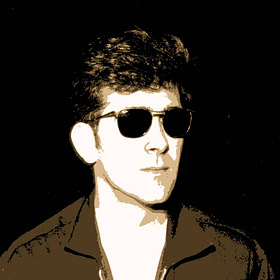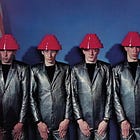Subverting Tropes
GUEST POST: The Personal Story Behind Tamar Berk’s ‘You Trigger Me’
People ask me about my songwriting process all the time.
Do you write the lyrics first and add the music? Do you write the music first and add the lyrics? Do you write it all at the same time? Do you have an idea or a title and go from there? Is your songwriting a subconscious experience?
My answer to these questions? All of the above.
Each song has its own unique process from conception to completion. And I like it that way because it keeps the art of songwriting personal, immediate, and an experience that always surprises me. I inevitably learn something about myself.
Recently, S.W. Lauden asked me if I would like to discuss the process of songwriting while focusing on the song “You Trigger Me” off of my new album Good Times for a Change (available on vinyl, CD and digital download). I mulled the idea over, and to be honest, procrastinated immensely at the thought of taking my jumbled, insane, and out-of-body songwriting process and trying to write a coherent essay.
Nevertheless, I’m always up for a personal challenge, and this song in particular was created based on some very unorthodox methods (for me)—yet the subject matter is something that affects me on a daily basis.
I had just finished writing and recording about 8 of the 12 songs on Good Times for a Change.
I was sitting in my studio pondering what song I should work on next when my phone started ringing. I looked at the name of the caller and it was a family member who I am currently caring for (albeit long distance)—I am in charge of managing their finances, health and other day-to-day dilemmas.
When I saw the name light up my phone, I instantly felt anxious and stressed. I decided to not answer the call, but rather text: “I’ll call you back in a bit, sorry in the middle of something.”
The ringing stopped. I sat there for a moment thinking about the flood of emotions that overtook me so quickly, scribbling down the following lines in my notebook:
Every time my phone lights up your name I start to panic like I might faint You trigger me
‘Hmmmm,’ I thought. ‘Is there something there or is this just a silly, overused trope?’
On one hand, I was dealing with a family member that required a lot and every time we spoke it seemed like a fight would ensue—raising our voices, cutting each other off; I would get so wound-up, angry and frustrated within minutes.
On the other hand, I knew that I had no choice in this situation. I couldn’t run away from the obligation (nor did I really want to) and I couldn’t change this person. Whenever they came up in conversation, I would end up saying something like, “I’m so triggered every time they call!” Yeah…‘triggered’... a word that is overused these days.
Could I use it in a way that might be fun, ironic and meaningful? I liked the challenge.
I made the decision that this was going to be a pop punk song so that the listener would have fun and be able to let loose while confronting the ‘triggers’ in their own life.
I hoped that once I started working on the lyrics I would somehow be able to convey the deeper message. To start with, I decided that this song had to be fast! For some songs, I’ll just create a click track with a tempo I like and then work on the demo drum tracks later, but in this case I wanted to try something new.
I headed over to YouTube to look for pop punk drum tracks in a variety of tempos above 160 beats per minute. I found a great one that was 186 bpm…a random number, but I liked the energy in the track, so I grabbed it and imported it into my new session.
I plugged in my Frankenstein’d, vintage 1967 Epiphone Wilshire with sick P-90 pickups into my 100 watt Bassman head and hit play on the session. The drums were loud and fast and before I knew it I was just playing a pop punk chord progression without even thinking! It came right out of me, and I felt that pure bliss of being inspired by a great drum track.
Once I had the verses and choruses, I figured out a neat little turn-around for the bridge and solo. The music was literally written within 15 minutes. There are those rare times when that happens…usually when I am super clear on the style, tempo and vibe of the song.
I hit playback and danced around my studio. I loved it!
Usually when I’ve started working on a song, I jump right into recording a rough vocal track after the main instrument (guitar or piano) and drums are recorded.
This is because I don’t want to waste time on a song that I might not like. It also affords me the opportunity to listen to the meat and potatoes of a song before spending too much time on something that might end up being awful.
I set up the mic and, once the music played, I got a burst of energy and just started singing using that first line I wrote. Other lyrics just flew out of me:
Every time my phone lights up your name I start to panic like I might faint And my heart starts racing but I know I gotta, gotta, gotta get over it So I take a deep breath and I jump right in And let you do most of the talking Cause I know if I open my mouth oh know I gotta, gotta, gotta get over it
That was it…the deeper meaning: ‘I gotta get over it.’
Let’s face it, when someone ‘triggers’ or affects us in any way it’s really on us to decide how we want to react. We can’t control other people’s behaviors or what they say. As much as I already knew that, writing this song somehow drove this point home.
Suddenly, I felt free! Since I knew I could only control myself, I sort of separated myself from taking the words personally; I can react or not react by controlling how and when the information comes to me.
Even though my phone might ‘light up’ I could:
Take a deep breath and just calmly respond, knowing most of what is said really has nothing to do with me at all; it’s just how I choose to interpret it.
Do less talking and respond only to what is necessary, without opinions.
Just say: “You seem nervous and anxious. What are you worried about?”
Songwriting is really magical because it reveals so many hidden aspects of our own psyche.
And this song, as silly and throwaway as it might seem, was an integral moment in the making of my new album because it helped to continue pushing the “change” theme.
The rest of this song came out quite easily once I enlisted: drummer Matt Walker (Morrissey, Smashing Pumpkins) to replace the digital beats; Joe George on that killer guitar solo; Allen Hunter (The Eels) on bass, and Mike Klooster (Smashmouth) on Farfisa. When I finished tracking and editing, I sent it off to Sean O’Keefe (Beach Bunny, Motion City Soundtrack) who made a killer mix that once again got me dancing around my studio.
All this to say, no two of my songs go through the same creation process—and that’s the thing that I really love about songwriting, recording and producing. When it comes down to it, the cathartic and beautiful moments in the songwriting process are still a mystery to me and I wouldn’t have it any other way.
Other Recent Guest Posts
“It’s Not The End Of The World”: A Brief Tommy Keene Retrospective
Tommy Keene died nearly seven years ago and, in the meantime, his legend has sadly not grown much.






